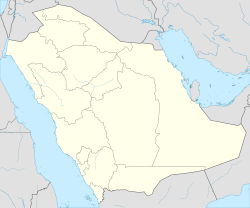Jubail
|
Jubail الجبيل |
|||
|---|---|---|---|
| City | |||
 |
|||
|
|||
| Coordinates: 27°0′N 49°40′E / 27.000°N 49.667°E | |||
| Country |
|
||
| Province | Eastern Province | ||
| Government | |||
| • Type | Monarchy | ||
| • Provincial Governor | Saud bin Nayef | ||
| Population (2011) | |||
| • Total | 378,949 | ||
| • Nationality (2011) |
33% Saudis 27% Indians 14% Filipinos 11% Pakistanis 11% Bangladeshis 2% Americans 1% Europeans 2.5% Other countries |
||
| Time zone | AST (UTC+3) | ||
| Website | www |
||
Jubail (Arabic: الجبيل, Al Jubayl) is a city in the Eastern province on the Persian Gulf coast of Saudi Arabia. It is the host of the largest industrial city in the Middle East. It is also home to the Middle East's largest and world's fourth largest petrochemical company. It has the world's largest IWPP (Independent Water and Power Project) producing 2743.6 MW of electricity and 800,000 m3 of water daily. Jubail comprises the Old Town of Al Jubail (Jubail Balad), which was a small fishing village until 1975 and the new industrial area. Jubail Industrial City is the largest civil engineering project in the world today.
In 1975, the Saudi government designated Jubail as the site for a new industrial city. Rapid expansion and industrialization ensued. The new industrial and residential areas were named Madīnat al Jubayl aṣ Ṣinā`īyah (Jubail Industrial City). The 2005 Census Report for Jubail Industrial City estimates the resident population at 224,430.
The town of Al-Jubail on the Persian Gulf coast of the Kingdom of Saudi Arabia has ancient roots. Human habitation dates back at least 7,000 years, when the people of Dilmun — whose civilization radiated up and down the coast of the Persian Gulf — established a settlement there.1
Al Jubail was founded by Al-Buainain, between the 18th and 19th centuries.
In September 1933, Jubail gained a measure of fame as the landing site for the first team of geologists to explore for oil in Saudi Arabia.
Bechtel began work on the Jubail Industrial City project more than 30 years ago and is still working in Jubail now. Bechtel has managed the Jubail project since it began in the mid-1970s, and in 2004 the Royal Commission for Jubail and Yanbu asked the company to manage Jubail II, a $3.8 billion expansion of the city's industrial and residential areas.
Jubail is directly connected with other cities by two major highways; Dhahran-Jubail Highway and Abu Hadriyah Highway.
...
Wikipedia


